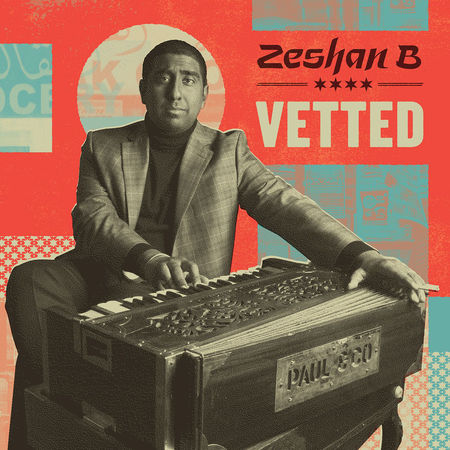 For the listener unfamiliar with Zeshan Bagewadi’s work, the sounds of his debut album, Vetted, are almost exactly what you wouldn’t expect in a musical landscape where many Desi-American artists deal in pop, electronica, and hip-hop. The cover artwork — a photo of the singer in a turtleneck and checked sport coat, hands on a harmonium — evokes the past, but in a way that straddles cultures and leaves few clues.
For the listener unfamiliar with Zeshan Bagewadi’s work, the sounds of his debut album, Vetted, are almost exactly what you wouldn’t expect in a musical landscape where many Desi-American artists deal in pop, electronica, and hip-hop. The cover artwork — a photo of the singer in a turtleneck and checked sport coat, hands on a harmonium — evokes the past, but in a way that straddles cultures and leaves few clues.
The first track, “Lonely Man,” immediately showcases Bagewadi’s style with the full sounds of a brass band and backup vocals, a dreamy mix of Motown and Bollywood big band hits of the 1960s and 1970s. His voice is deep and mournful and velvety, providing a contrast to the sharp brass sounds that accompany it. And yet, despite its depth, his vocal range is impressively large; the high notes seem to come out of nowhere, piercing through one’s consciousness just as the song starts to become repetitive, snapping listeners back to the moment precisely, shocking them back into attention.
“At the Breaking Point,” the album’s second track, is much like the first; the combined effect of the two is nostalgia. It’s easy to picture an underground jazz club with Bagewadi’s rich vocals taking center stage, supported by mournful brass instruments and soft female backup vocals to smooth the band’s harsh edges. But almost as quickly as the listener begins to settle into a musical style of days past they think they know, he throws another curveball in the form of the first few bars of the album’s third song “Ain’t No Love in the Heart of the City.”
The song opens with a repeating chord progression on the harmonium, lulling the listener into an almost trance-like state. Bagewadi sings the first two lines in Urdu, and his voice is transformed — any rough edges or straining completely disappear. The short alaap, an improvised series of notes the singer uses to introduce the raag in the beginning of a song in South Asian classical music, is perhaps the most beautiful few bars on the whole album; his voice glides over them, as if the entire album up to that point was merely a warm-up to that moment.
Eventually, that first rapturous minute of “Ain’t No Love in the Heart of the City” ends, the brass band returns, and for the most part, the musical style returns to that of other songs on the album. The song blooms into a soulful ballad with plenty of support from backup vocals, snare drum, and the electric guitar. However, the song is not as purely soul as it may sound on first listen. Those classical Hindustani seeds that Bagewadi planted in the first few bars continue to grow throughout the song, and though subtle they are never drowned out. The vocal improvisation shows adherence to raag structure — an attribute that makes it complex and clean at the same time, and an absolute listening pleasure.
The next song to deviate from the mournful soul and blues ballads Bagewadi favors on Vetted — “Meri Jaan” — is also the second song in Urdu. It’s sharp and snappy, and in stark contrast to the previous tracks, upbeat.
Unlike “Ain’t No Love in the Heart of the City,” “Meri Jaan” is entirely in Urdu. However, it does not have the strong South Asian classical music influence that the former so elegantly displays. Instead, “Meri Jaan” seems to take inspiration from Elvis Presley’s style — Bagewadi sing-talks in his signature deep register in short, staccato bursts, which are interrupted by twangy guitar interludes and one striking, magnificent harmonium solo. The result is a supremely danceable song, almost compelling a listener to do the twist.
The rest of the album continues in much the same tone. Bagewadi covers George Perkins & the Silver Stars’ “Cryin’ in the Streets” with its lyrics about Dr. Martin Luther King’s assassination and the civil rights movement, with a somewhat Desi flair. The result is musically beautiful, although unbearably sad. Bagewadi’s version intensifies and focuses the original melody’s lamenting tone, making it crushing.
The album’s dirge-like tone is relentless. With the notable exception of “Meri Jaan,” every track has a mourning quality, both musically and lyrically. Particularly in songs with a strong Hindustani classical music influence, such as “Hard Road to Travel,” the vocal improvisation so inherent to that style veers in the direction of the supremely sad. Bagewadi does this well — his voice seems almost made for this sort of improvisation — but the collective effect is one of melancholy.
Listened to from start to finish, Vetted is an album of deep introspection. Rife with self-awareness, the work evokes an existential crisis on each listen. It’s almost too dense, too sad, too overwhelming for a nonstop listen-through; Bagewadi’s voice and tone expertly pull on the heartstrings. However, breaking the record down into digestible pieces, concentrating on each song — the music, the lyrics, the band — is an absolute delight, sure to convert even the most uninitiated of listeners into fans of Bagewadi’s particular brand of blues and soul.
***
Rashmi Venkatesh is a pharmacologist who now works behind a desk and lives in the Metro D.C. area. Her interests include feminism, pop science, South Asian diasporic culture and media, and biryani. You can find her on Twitter at @rashmiv11.












